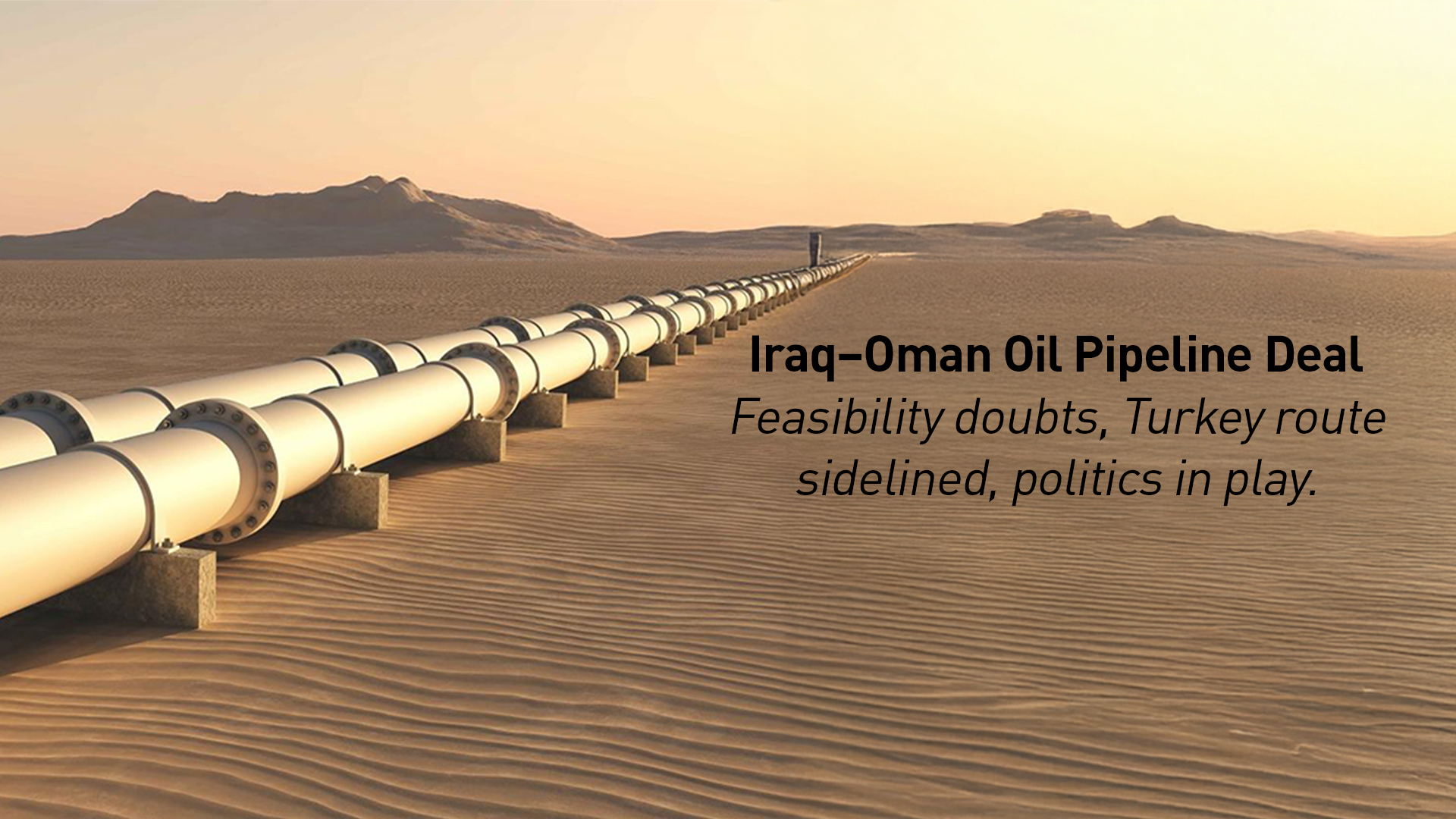Iraq, Oman Reach Preliminary Agreement on Oil Pipeline Project Amid Feasibility Doubts and Geopolitical Calculations
Project sparks debate over costs, routes, the sidelined Iraq–Turkey pipeline, and the hidden politics shaping Iraq’s export strategy.

ERBIL (Kurdistan24) — Iraq announced on Thursday its intention to construct a new crude oil pipeline extending from Basra through the Gulf to the Sultanate of Oman, allegedly to diversify and expand its oil export routes.
Ali Nizar, Director General of Iraq’s State Oil Marketing Organization (SOMO), confirmed to local media that “initial discussions and a preliminary agreement have been reached between Iraq and Oman to build an oil pipeline and jointly market crude in global markets.”
As a first step, Iraq and Oman will build oil storage facilities with a capacity of 10 million barrels at Oman’s Duqm port, with potential expansion in the future.
“Once the storage tanks are completed, crude oil will initially be transported by tankers until the construction of the pipeline is finalized,” Nizar explained.
He added that the two countries are still evaluating the potential routes.
“If the pipeline is built overland, agreements with transit states will be required. If it is laid undersea, it will run through the Arabian Gulf from Basra to Oman’s port,” he noted.
The announcement follows the signing of two agreements and 24 memoranda of understanding between Iraq and Oman on September 3, during Prime Minister Mohammed Shia’ al-Sudani’s visit to Muscat, where he met with Sultan Haitham bin Tariq Al Said.
Beyond Economics: Feasibility Doubts and Geopolitical Calculations
While the proposed Iraq–Oman pipeline is presented as a strategic project to diversify oil export options, serious questions arise regarding its economic feasibility.
The route from Basra to Oman is considerably long and costly, making it far less practical compared to shorter, existing alternatives. Neighboring countries such as Turkey, Kuwait, the UAE, and Qatar offer geographically closer and more economically viable pathways for Iraq to expand its crude oil exports.
This raises doubts about whether the project is driven primarily by economic logic or by geopolitical and security considerations.
Extending a pipeline to Oman could allow Iraq to bypass certain regional chokepoints and reduce reliance on traditional export partners, but it also points to broader strategic calculations involving Gulf dynamics, maritime routes, and political alliances.
The Iraq–Turkey Oil Pipeline Factor
Iraq already possesses a key oil export infrastructure through the Iraq–Turkey pipeline, which carries crude from Kirkuk and the Kurdistan Region to Turkey’s Ceyhan port on the Mediterranean.
This pipeline, historically one of Iraq’s most significant export routes, has been capable of transporting hundreds of thousands of barrels per day, providing a direct link to European and global markets.
However, exports through this pipeline were halted by Baghdad in 2023 after a ruling by the Paris-based International Chamber of Commerce (ICC) arbitration court, which sided with the Iraqi federal government in its dispute with Ankara over independent oil sales conducted by the Kurdistan Regional Government (KRG).
Since then, the suspension has been used by Baghdad as a political tool to restrict the Kurdistan Region’s ability to generate independent revenues, thereby limiting its economic autonomy.
The halt in exports has not only strained Erbil–Baghdad relations but also inflicted heavy financial losses on both sides, as the Kurdistan Region relies on oil sales for the bulk of its budget, and Iraq loses a significant export outlet.
Experts argue that Baghdad’s reluctance to resume flows is less about technical or legal obstacles and more about leveraging the pipeline issue to centralize control over the country’s oil revenues and curb the Kurdistan Region’s economic independence.
In this context, Iraq’s push for an Oman pipeline, despite the steep costs and logistical hurdles, appears less about efficiency and more about strategic maneuvering.
It underscores Baghdad’s willingness to pursue politically motivated alternatives even when closer and more established export routes remain idle.